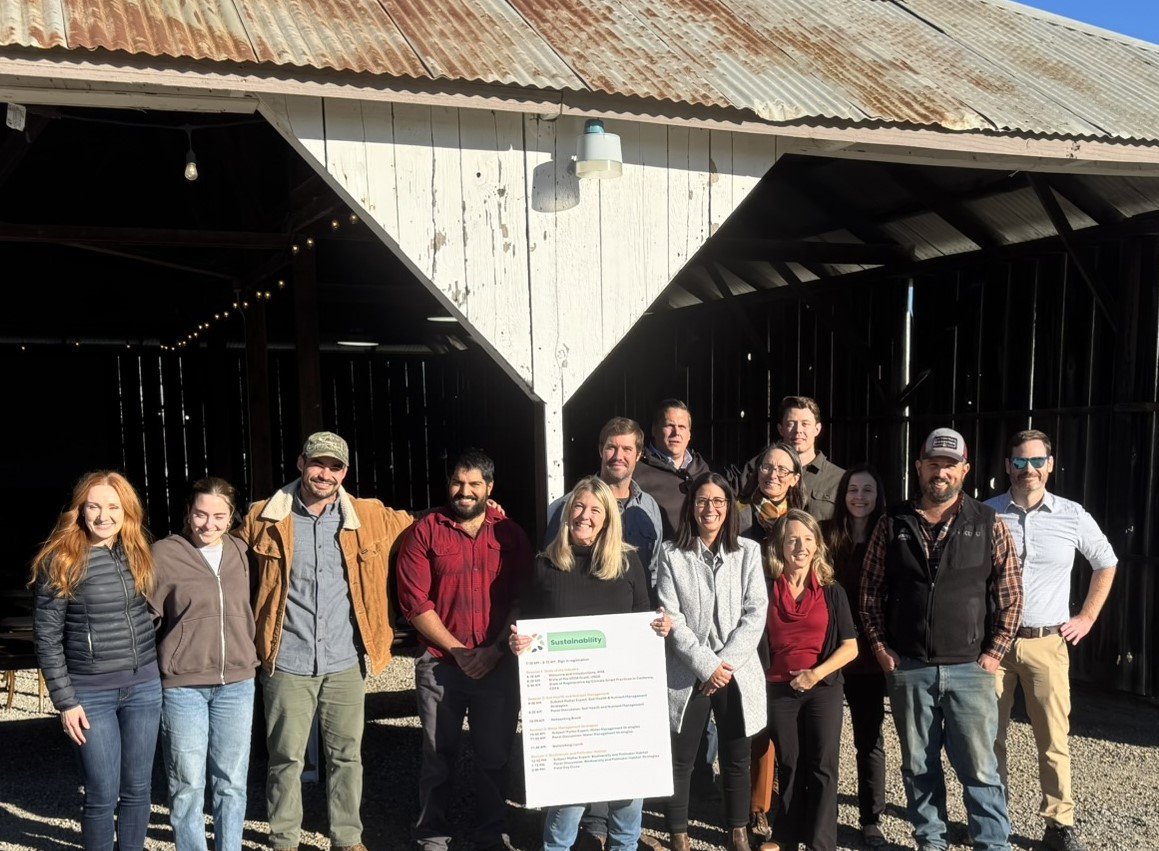First USDA Partnerships Climate-Smart Commodity Grant West Coast Field Day
On December 4, 2024, after months of preparation and collaboration with the California Walnut Commission, Blue Diamond Almonds, the International Fresh Produce Association (IFPA), and Measure to Improve the first USDA Partnerships for Climate-Smart Commodity Grant West Coast Field Day was successfully held at Chamisal Creek Home Ranch in Arbuckle, California. This event not only marked a pivotal moment in advancing the grant program but also advancing sustainability in agriculture.
About the Field Days
The USDA Partnerships for Climate-Smart Commodity Grant program is a $3.1 billion investment by the USDA aimed at expanding markets for U.S. climate-smart commodities, leveraging the greenhouse gas benefits of climate-smart commodity production, and providing direct, meaningful benefits to production agriculture, including for small and underserved producers.
The Field Days are a cornerstone of this effort, offering a platform for stakeholders to share insights, explore practical solutions, and forge collaborations that drive progress in soil health, nutrient management, and water management strategies.
Insights and Takeaways from the Field Day
Throughout the day, panelists and subject matter experts shared perspectives and strategies for addressing the challenges and opportunities of climate-smart agriculture:
Soil Health and Nutrient Management
Dr. Jessica Chiartas, Chief Scientist at UC Davis/RegenScore, emphasized the importance of treating soil as a dynamic living system, urging growers to adopt holistic approaches to nutrient management. "Carbon is the currency that drives microbial activity and is much more complex than just soil organic matter," she noted, highlighting the need for balance in soil management practices.
Water Management Strategies
Dr. Ken Shakel, Research Scientist at UC Davis, discussed how measuring and responding to the plant's water needs, rather than relying solely on soil-based irrigation schedules, can lead to more efficient and climate-smart water management practices. "Measuring the tree tells you what it really needs, and most of the time, it'll tell you it needs much less water," he explained.
Biodiversity and Pollinator Habitat
Experts like Dr. Josette Lewis, Chief Scientific Officer at the California Almond Board, and Christine Gemperle, from Gemperle Orchards, underscored the benefits of integrating traditional practices like cover cropping with modern technology and science. "A diverse diet for pollinators enhances their health and brings it closer to more natural systems, keeping things in balance," noted one panelist, stressing the interconnectedness of ecosystem health and agricultural productivity.
A Collaborative Path Forward
The day also reinforced the opportunity for growers to position themselves as stewards of the land. Through investments in holistic conservation practices and collective action, growers can enhance agroecosystem health while meeting consumer demands and navigating volatile markets. As one panelist observed, regenerative agriculture combines historical practices with modern science to achieve measurable benefits like carbon sequestration and soil health.
The day emphasized collective learning and action. By uniting as a community, growers can share insights, reduce duplicative efforts, and accelerate the adoption of practices that ensure economic and environmental resilience.

















Looking to the Future
Field Days are more than networking events; they are catalysts for change. The USDA Partnerships for Climate-Smart Commodity represents a long-term vision for agriculture, where innovation meets tradition and collaboration drives sustainability. These gatherings help stakeholders navigate challenges like climate variability, market demands, and regulatory shifts, ensuring agriculture remains viable and vibrant.
Karen Ross, Secretary of Agriculture for the California Department of Food and Agriculture, noted, "Regenerative is taking agricultural sustainability to another level. By taking historical practices and applying modern technology and science, it can help us do an even better job of achieving measurable soil health benefits and sequestering carbon. Carbon has a value, and the ability for farmers to have solutions to sequester it will be hugely transformational."
Thank You, Participants and Partners
A special thank you to Eric Hansen, National Program Officer with the USDA Partnerships for Climate-Smart Commodities Grant Program, for making the trip from Washington, D.C., to join us at the Field Day. His willingness to listen to growers’ challenges, observe their progress, and provide thoughtful guidance exemplifies the USDA’s commitment to supporting growers in building resilience in their operations.
Measure to Improve extends its gratitude to the California Walnut Commission, Blue Diamond Almonds, IFPA, and all participants who contributed to this successful event. Together, we are shaping a future where climate-smart practices drive sustainability and in this industry forward.

